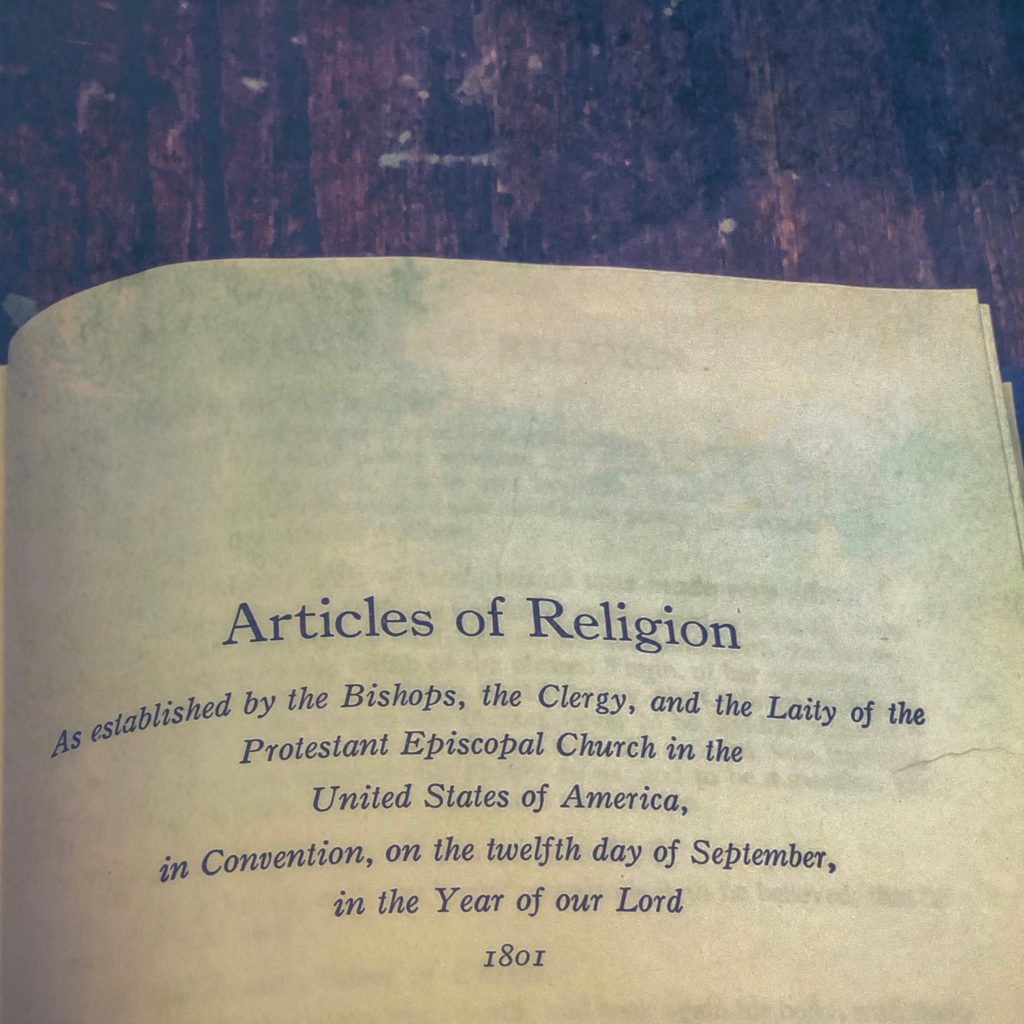
Although in the visible Church the evil be ever mingled with the good, and sometimes the evil have chief authority in the Ministration of the Word and Sacraments, yet forasmuch as they do not the same in their own name, but in Christ’s, and do minister by his commission and authority, we may use their Ministry, both in hearing the Word of God, and in receiving the Sacraments. Neither is the effect of Christ’s ordinance taken away by their wickedness, nor the grace of God’s gifts diminished from such as by faith, and rightly, do receive the Sacraments ministered unto them; which be effectual, because of Christ’s institution and promise, although they be ministered by evil men.
Nevertheless, it appertaineth to the discipline of the Church, that inquiry be made of evil Ministers, and that they be accused by those that have knowledge of their offences; and finally, being found guilty, by just judgment be deposed.
by the Rev. Dr. Heather McCance
In the wake of the #MeToo movement, there has been a renewed conversation about how, or whether, one can continue to appreciate the work of someone who is known to be a sexual predator. Can we continue to appreciate the comedy of Bill Cosby, the films of Harvey Weinstein, the music of R Kelly? Can we separate the art from the artist?
Similar instincts kick in when we think about the possibility of receiving sacramental ministry from a priest who is “wicked,” someone who has molested children, or who has sexually harassed adults, or who has embezzled funds from the church, or whatever the specific sin might be. Many of us simply would have a visceral reaction against receiving holy communion from such a priest, nor would we want to be baptized by, nor have our children baptized, by someone like that.
Leaving aside the question of separating art from artist, can one separate the sacrament from the minister? Article 26 says, emphatically, yes.
The question of the worthiness of the minister impacting the efficacy of the sacrament has been around since at least the third century. Tertullian wrote in his treatise De Baptismo that heretics did not believe in the same God or the same Christ as Christians do and that therefore their baptism was not truly a Christian baptism. St. Cyprian of Carthage agreed, noting that former heretics seeking to join the true Church were quite happy to submit to true baptism, themselves understanding that being baptized by heretics outside the church could hardly have gained them admittance to the church (Epistle 72). Nonetheless, Stephen, Bishop of Rome, disagreed with the position of these fathers of the Church and, in the first such exercise of papal authority, commanded obedience to the position that any baptism performed with water and in the name of the Father, Son and Holy Spirit is valid. This has been official teaching of the Western Church since the mid-third century; the sacrament is valid regardless of the flawed beliefs of the minister.
In the fourth century, St. John Chrysostom leant his agreement to the argument, writing, “God uses to work even by unworthy persons, and in no respect is the grace of baptism damaged by the conduct of the priest: else would the receiver suffer loss” (Homily VIII on First Corinthians). St. Augustine went further more than a century after Stephen, asserting that it is not the ministers themselves who confer either remission of sins or the grace of the sacraments. Instead, the Holy Spirit works through the imperfect human beings who minister the sacraments to the faithful. After all, he writes, all human ministers are sinners, the bad and the worse, and it is only God, who is perfect, who can confer grace upon we human creatures (On Baptism, Against the Donatists).
Unsurprisingly, however, that did not put an end to the conversation. Throughout the middle ages there were members of the clergy, from those in the upper echelons of the hierarchy to local friars, whose conduct served to elicit scandal among the faithful laity. Whether wine, women, or wealth, abuse of power or abuse of persons, the poor conduct of a seemingly large number of priests has often been cited as one of the reasons the Reformation took hold of the popular imagination.
Given the situation of the Church in England through the latter sixteenth century, which swerved from Catholic to Protestant to Catholic and back again, it was entirely predictable that the question of the worthiness of the priest administering sacraments would again come under scrutiny. Could a priest who had turned his back on the pope administer a valid sacrament? Could a married priest?
As with much of the formation of the Church of England, and seen particularly in the Thirty-Nine Articles, a middle ground between the ways of the Anabaptists on one hand the Roman church on the other was sought. The Anabaptists sought a pure church led by truly holy ministers, and railed against the impropriety of receiving sacraments from ungodly ministers. Arguing from John 9:31, that God does not hear the prayer of sinners, they suggested that only a holy person could therefore effectively ask God to bless bread, wine, and water. The Roman Church, in the Council of Trent (1545-63), had recently upheld the teaching that the effectiveness of the sacraments is safeguarded not by the holiness of the priest but by his intent as he presides over the sacred mysteries and by virtue of his ordination.
Both of these positions raised questions for the leaders of the English Church. On one hand, as Augustine had written, all human beings are sinners and thus determining how sinful a priest has to be before the effectiveness of the sacrament is impacted is not a helpful road to travel. Indeed, it is not Christ who taught that God doesn’t hear the prayer of sinners, but the man born blind offering what was perhaps common wisdom of the day.
On the other hand, the Roman doctrine of intent might raise worrisome doubts about the effectiveness of the sacrament on any given day. What if the priest was thinking about his grocery list at the critical point in the prayer of consecration? What if the priest, angry at the crying of a baby, was thinking uncharitable thoughts towards the child as he poured water upon the head of the bawling brat? If ‘intent’ of the priest is the standard by which a sacrament’s effectiveness is to be judged, how can anyone ever be certain that any sacrament ever has been truly celebrated?
The English Reformers turned, as they were wont to do, to the Scriptures for guidance. While silent on this particular question, some wisdom was nonetheless to be gleaned from Jesus’ words to the crowds and to his disciples to listen to the scribes and Pharisees who sit on the seat of Moses, while avoiding imitating their behaviour (Matthew 23:2-3). The behaviour or sinfulness of those in positions of authority is not the question here, but rather the authority their position lends to their words. In the opening words of this Article can also be heard something of an echo of the parable of the wheat and the tares (Matthew 13); in this world, good and evil are intermingled and ever shall be until the final harvest at the end of time, and this is true among the ranks of the clergy as well.
The Sacraments are a means of God conferring grace upon God’s people. Their given-ness by Christ is fundamental to their nature. To argue that the unworthiness or intent of the minister of the sacraments could in some way hinder their effectiveness is to argue that it is within the power of human beings to frustrate the gracious purposes and promises of God. Human ministers are simply God’s instruments, tools through which grace is given in the sacraments, and that grace happens regardless of the quality of the instrument. Article 26 firmly asserts that this is not the case.
The final paragraph of the Article deserves some attention. Even granted that the sacraments are effective regardless of the worthiness of the minister, the Church bears a huge responsibility to ensure that everything possible be done to prevent “evil Ministers” from gaining office. During the Reformation, that included examinations of conscience and renewed preparation regimes prior to ordination. Today in different parts of the Anglican Communion this could include everything from speaking to references to police records checks to psycho-sexual evaluations of postulants. Various Safe Church policies are in place to protect the vulnerable. Yet as Jesus said, there are still tares among the wheat. Whenever an accusation of wrongdoing is made against a priest “by those that have knowledge of their offences” it is absolutely incumbent upon the Church to take this seriously, to take action, to make inquiry, so that such people “by just judgement be deposed.”
So yes, we can separate the sacrament from the minister; the sacrament is a means of God’s grace regardless of the worthiness of the minister. However, the Church is constrained by the call of God’s justice and holiness to do all in its power to prevent and remove “evil Ministers” from places where they can do harm to God’s people.
The Rev. Dr. Heather McCance is a priest in the Anglican Church of Canada and serves as the Diocesan Ministry Developer for the Diocese of Rupert’s Land. Her role and her passion is to equip the saints for the work of ministry, lay and ordained. She has particular skills in mentoring (both in mentoring others herself and in training others to be mentors), and holds a Doctor of Ministry degree from Tyndale Seminary in Toronto in ministry leadership.
